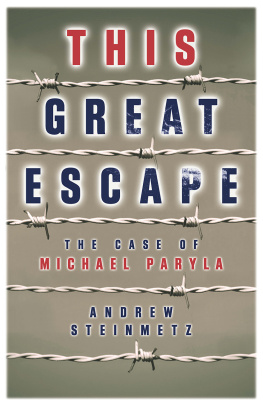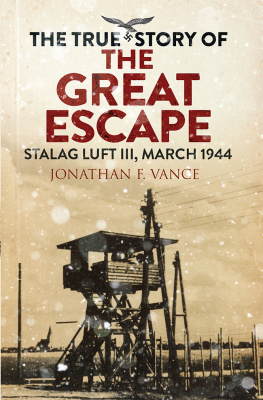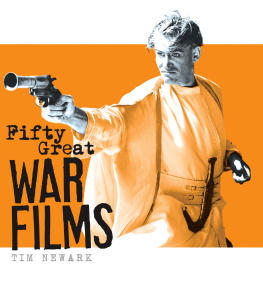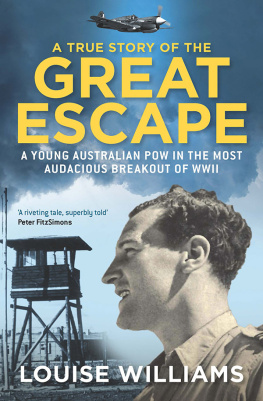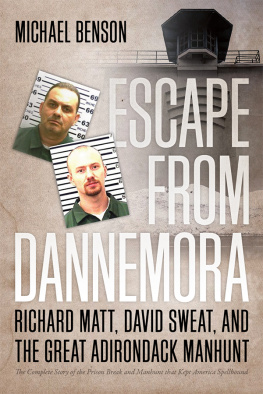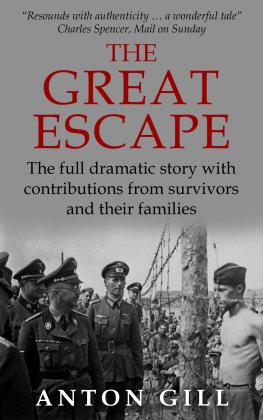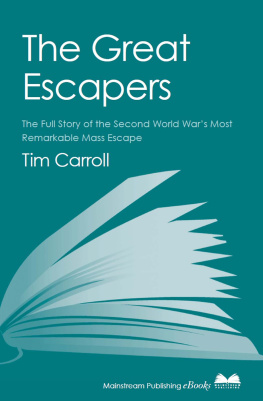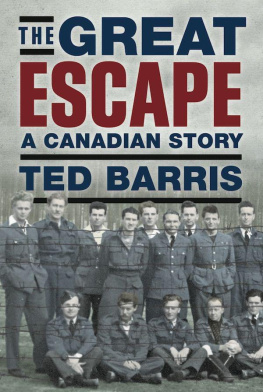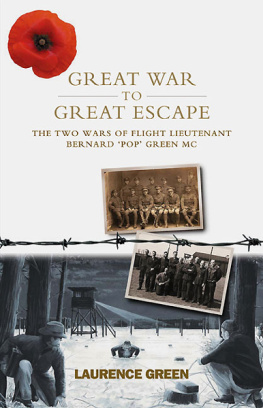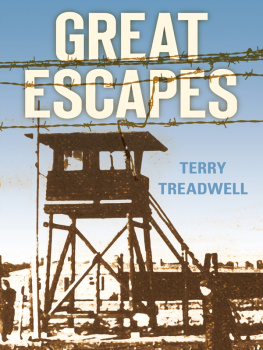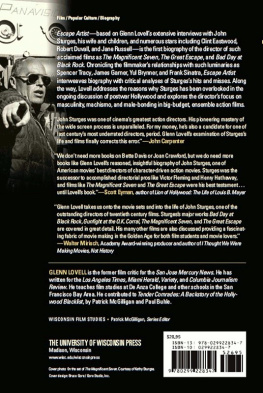Andrew Steinmetz
This Great
Escape
The Case of Michael Paryla
BIBLIOASIS
Windsor, Ontario
Copyright Andrew Steinmetz, 2013
All rights reserved. No part of this publication may be reproduced or transmitted in any form or by any means, electronic or mechanical, including photocopying, recording, or any information storage and retrieval system, without permission in writing from the publisher or a licence from The Canadian Copyright Licensing Agency (Access Copyright). For an Access Copyright licence, visit www.accesscopyright.ca or call toll free to 1-800-893-5777.
FIRST EDITION
Library and Archives Canada Cataloguing in Publication
Steinmetz, Andrew
This Great escape : the case of Michael Paryla / Andrew Steinmetz.
Electronic monograph in ebook format.
Issued also in print format.
ISBN 978-1-927428-34-4
1. Paryla, Michael, 1935-1967. 2. Paryla, Michael, 1935-1967In
motion pictures. 3. Great escape (Motion picture). 4. ActorsGermany
(West)Biography. 5. ActorsCanadaBiography. 6. Jewish actors
Germany (West)Biography. 7. Jewish actorsCanadaBiography. I. Title.
PN2658.P359S74 2013 791.43028092 C2013-901998-7
Edited by Dan Wells
Copy-edited by Alice Petersen
Typeset by Chris Andrechek
Cover Design by Gordon Robertson



Biblioasis acknowledges the ongoing financial support of the Government of Canada through the Canada Council for the Arts, Canadian Heritage, the Canada Book Fund; and the Government of Ontario through the Ontario Arts Council.
The story that I am about to tell, a story born in doubt and perplexity,
has only the misfortune (some call it fortune) of being true.
Danilo Ki
What the hell kind of great escape is this? No one escapes!
Louis B. Mayer
For Sonya and Emil
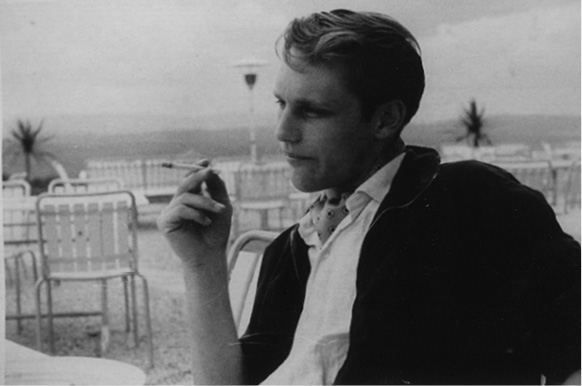
Breakfast between Zurich and Bern
Michael Paryla, August 1957
Appell
Appell is taken early and late. Each day in rows we stand in the compound and are counted. But counting is for children and numbers no great matter. Escape is hidden within. Like death from the living by the miracle of birth. How shall I put it? Escape is like an order from above issued from inside. Searchlights may sweep the forest at night all night, seismographs sunk in the earth may record prisoners digging. Despite it all, Michael, I have compiled the following case history with the pen that hangs on a string like a worm around our necks.
Escape Construction
| Breakdown of Materials | Tom, Dick & Harry (1944) | Michael (1967) |
| Bed boards | 4,000 | 0 |
| Bed Covers | 192 | 1 |
| Beading battens | 1,370 | 0 |
| Blankets | 1,699 | 1 |
| Pillow cases | 161 | 2 |
| Towels | 3,424 | 0 |
| Chairs | 34 | 0 |
| Single tables | 10 | 0 |
| 20-man tables | 52 | 0 |
| Benches | 76 | 0 |
| Double-tier bunks | 90 | 0 |
| Knives | 1,219 | 0 |
| Spoons | 478 | 0 |
| Shovels | 30 | 0 |
| Forks | 582 | 0 |
| Lamps | 69 | 0 |
| Electric Wire (feet) | 1,000 | 0 |
| Rope (feet) | 600 | 0 |
| Bed bolsters | 1, 212 | 0 |
| Water cans | 246 | 0 |
| Milk (Glasses of) | 0 |
| Barbiturates (Medicine bottles) | 0 | 1 |
| Whiskey (750 ml bottle) | 0 |
| Alarm clocks | 0 | 1 |
Screenplay
1963. The Great Escape The Mirisch Company Inc. Presents
INT. TRAIN COMPARTMENTDAY . The door opens and a Gestapo agent enters. He glances at the identity cards offered by a pair of SS officers. Not of interest, not on his list. In total there are 76 escaped prisoners from Stalag Luft III and Hitler has ordered a nationwide manhunt, eine Grofahndung . The Gestapo agent moves forward and then stops when he comes face to face with the actors Richard Attenborough and Gordon Jackson, escaped POWs disguised as businessmen on the train. There is something about them . He studies their papers closely and questions them in German and in French. He hands the props back, and moves past them into the coach ahead.
The train slows down as it swings into the turn of a steep gradient. At 2:14:34 run time, the Gestapo agent finds the actor David McCallum and flips through his passbook. McCallum is cast as Flight Lieutenant Ashley-Pitt, better known as Dispersal to his POW buddies. (The ensuing brief exchange between the Gestapo agent and Ashley-Pitt does not match James Clavells draft screenplay of April 26, 1962; it was improvised or it followed the final shooting script, of which there were more than seven in circulation on the set during the making of the movie.)
Gestapo (standing): Sie reisen fr eine Firma?
Ashley-Pitt (seated): Ja. Fr mein Geschft.
Gestapo: Danke.
Ashley-Pitt: Danke.
Are you traveling for your company? Yes, for my business. Thank you. The Gestapo man exits the coach and the door slides shut behind him, and thats the last an English audience sees of this actor alive. Hes had perhaps a minute of screen time in one of the most watched war movies of all time, but is not credited for the role, a bit part. Shortly after the film was made he died, aged 32, from a drug overdose in Hamburg. Watched by millions yet completely unknown, eclipsed by Hollywood stars. And theres a further irony. He was a refugee from Nazi Germany, partly Jewish and the son of one of Austrias most celebrated left-wing actors, playing a Gestapo agent, a role reprised on thousands of television repeats.
In fact, watching television is how I came to know of my cousin Michael. Alive but not living, stranded in the no-mans-land of a motion picture. His character is staged and scripted, but I was spellbound nonethelessMichael was convincing. Fedora and trench coat. Elegant. Blond. His smooth transitions. His lively walk, his coat unbuttoned, his fashion bespoke the casual flair of some fresh-as-the-breeze fascist. This image, I now understand many years later, is counterfeit, a convenient archetype manufactured by the American film director John Sturges and his sidekick Bert Hendrickson in Costume Design and Wardrobe. But it is him, close enough to the real thing. So what to call him? Historicized? Fathers cousin? My first cousin once removed? The family used Michi . As in, Michi broke Mamas heart .
Michis Diary
I HOLD IN MY HANDS HIS OLIVE Tagebuch from the summer of 1949, when he was fourteen. He writes from Lahr, from inside a Displaced Persons camp located in the French zone of post-war Germany. Michi in transit with his mother, Eva, and stepfather, Antoine Stehr, bound for Canada. The diary is slim, composed in German. Folded and tucked within the pagesa letter never sent, addressed to Georg, a school friend. There are not many entries, but I have enough work overturning each heavy, capitalized noun in German, and then inspecting the underneath for the imprint of his mind in English. I rely on others and the Collins German Dictionary to find his voice.

